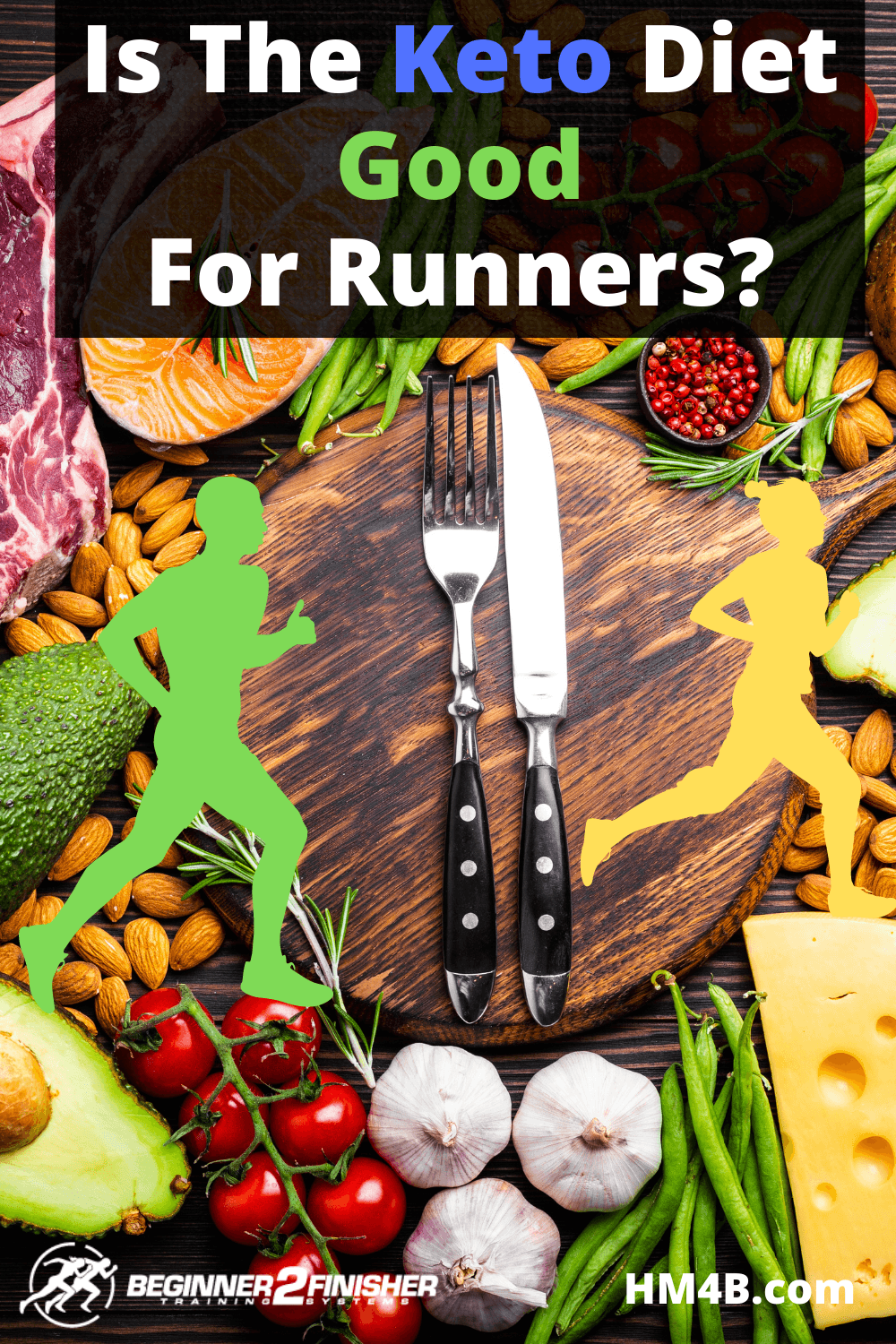The keto diet is good for runners who prefer low-intensity runs for long distances.
If you are into running or sports in general, then you know that your diet is just as important as your exercise. In fact, what you eat will directly affect your results.
Is the keto diet a great choice for runners? Or will it do more harm than good? It’s time to find out!
What Is the Keto Diet?
The keto diet, or the ketogenic diet, is an extremely low carb and high-fat diet. Unlike a lot of other low-carb options, the keto plan focuses on fat, rather than protein.
The goal of the diet is to force your body to start using ketone bodies (the liver produces those from stored fat) to provide your organism with energy. If you start depriving your body of carbs, then your organism will be put in the metabolic state of ketosis (hence the name of the diet).
In a nutshell, ketosis is when the body uses fat for fuel instead of carbohydrates like sugar that is usually the main energy source.
There are different types of ketogenic diets:
- The standard keto diet – 70% fat, 20% protein, 10% carbs.
- The cyclical keto diet – 5 keto days that are followed by 2 days high in carbs.
- The targeted keto diet – this one allows you to add more carbs whenever you work out.
- The high protein keto diet – 60% fat, 35% fat, 5% carbs.
Is the Keto Diet Good for Runners?
There is no single answer to this question and the opinions of experts differ.
Most runners prefer to have a good pre-race meal and then include plenty of carbs and protein into their recovery meal. With the keto diet, you won’t be able to fuel your body with carbohydrates and too many proteins.
Brett Osborn, a neurosurgeon and nutrition adviser, says that endurance athletes can benefit a lot from the keto diet. During long events, our bodies are used to running mainly on fats and/or ketones.
If you decide to follow the keto diet, you can literally go into the race in the fat-burning state without making your body do the switch between carbs and fats during the run.
However, James Fell, a professional runner and author, has a different opinion. He is sure that the keto diet is not suitable for anyone who is engaged in a high-intensity activity. Fat is low-combustion fuel and during your run, you might need immediate access to quick-burning carbs that a keto diet lacks.
Runners who prefer low-intensity runs on long distances might benefit from the ketogenic diet. But such a plan may not be great for high-intensity runners, as a keto diet decreases power and speed and might simply not be able to provide enough energy.
All experts agree on one thing – if you ever decide to give the keto diet a try, you have to pay extra attention to how your body responds to the change.
Related: What Is Meal Prepping? What are the best meal preparations for runners?
Benefits of the Keto Diet
The keto diet is all about feeding your body with the “good” fats. No wonder such a plan has quite a few benefits.
- Weight loss
People who have decided to go on a keto diet can rapidly lose weight. The plan can also lead to the retention of muscle mass.
- Stronger mental performance
The intake of omega-3 improves learning ability and mood, while the production of a certain form of ketone (beta-hydroxybutyrate) supports long-term memory function.
- Improves heart health
A keto diet helps reduce cholesterol and that, in its turn, decreases the risk of various cardiovascular diseases.
- Improves acne
Acne can have different causes, but some of them link to blood sugar and diet. The decrease in carb intake may positively affect skin health in some people.
By the way, the keto diet is recommended for diabetes management as it helps decrease blood pressure levels in people with type 2 diabetes and assists in restoring insulin sensitivity.
Related: Does Intermittent Fasting Actually Work To Help You Lose Weight?
Drawbacks of the Keto Diet
Unfortunately, it’s not all sunshine and rainbows.
The people with diabetes who are insulin-dependent, those with eating disorders, pancreatitis, kidney disorders, and pregnant woman or woman during breastfeeding should avoid the ketogenic diet.
Staying on this plan for too long may result in an increased risk of kidney stones, mineral and vitamin deficiencies, and some other health problems.
Moreover, there is a list of unpleasant symptoms that might occur 2-7 days after starting the new diet (we’ll discuss those a little further).
Related: 11 Reasons Why Your Running Performance Isn’t Improving!
Will a Keto Diet Help Me Lose Weight?
Of course, every case is different, but the keto diet is known for inducing rapid weight loss. This happens due to both water and fat loss.
As soon as you reduce your calorie intake but continue to burn plenty of energy, you will start to lose weight.
However, do bear in mind that a keto diet is not recommended as a long-term weight loss program.
Related: Why Am I Struggling To Lose Weight While Running
Related: How To Fortify Your Mind To Help You Lose Weight!
Is the Keto Diet Hard to Adhere to Long-Term?
Staying on the keto diet long-term may lead to several unpleasant conditions, including an increased risk of such health problems as:
- Mineral and vitamin deficiencies
- Excess protein in the blood
- Kidney stones
- A build-up of fat in the liver
What Is the Biggest Macronutrient I Have to Minimize While on the Keto Diet?
People on a keto diet restrict the intake of two macronutrients – protein and carbs.
However, to make your body go into the state of ketosis, you have to make sure that it doesn’t have enough glucose that can be used as fuel.
The majority of guidelines recommend you stay between 15 and 30 grams of net carbs per day (5-10% of total calories).
Are There Any Side Effects to the Keto Diet?
There is such a thing as “keto flu“. The term is used to describe a group of symptoms that might occur 2 to 7 days after starting the ketogenic diet. Those will, most likely, go away as soon as your body gets used to the new plan.
- Headache
- Fatigue
- Foggy brain
- Difficulty sleeping
- Nausea
- Constipation
- irritability
What Other Diets Are Popular for Runners Besides the Keto Diet?
The great news is that if you are a runner, there are quite a few diets that you can try out to find what works best for your body.
Vegetarian
A vegetarian diet provides you with all the necessary macronutrients but doesn’t include any meat products.
Paleo diet
The idea of a paleo diet is to go back to our caveman roots and start eating lean meat, fish, non-starchy veggies, and fruits.
Related: Is the Paleo Diet Good For Runners?
Mediterranean diet
This one is more of a lifestyle shift, rather than a diet. This way of eating focuses on the products that can be found in the Mediterranean region (seafood, vegetables, fruits, olive oil, nuts, seeds).
What Are the Key Differences Between a Keto, Paleo, and Mediterranean Diet?
All these diets are centered around whole foods and include quality sources of macronutrients.
However, out of the three, the keto diet is the one that drastically limits the intake of carbs.
Another key difference – those on the keto diet are changing the type of fuel their body gets and are inducing ketosis.
To Sum Up
What is the keto diet – is the keto diet good for runners? Whether this plan would work wonders for you fully depends on how your body is going to react to the new diet.
Some runners might benefit from a ketogenic diet, while others won’t. However, you might want to at least give the plan a try, if you don’t have the medical conditions mentioned above.
Related: Which Exercise Machine Is The Best At Helping You Lose Weight?
| Help support me and subscribe to my YouTube channel. YouTube video - 30 ways to make your runs less painful! Coach Scott's Credentials:
|
To sign up for a FREE half marathon training schedule, log sheet, and pace predictor CLICK HERE.

Recommended gear for runners
Connect with me:
| facebook.com/BeginnerToFinisher/ |
References
https://www.diabetes.co.uk/keto/types-of-ketogenic-diet.html
https://www.healthgrades.com/physician/dr-brett-osborn-x47jq
https://www.diabetes.co.uk/keto/keto-diet-benefits.html
https://www.bbc.co.uk/food/articles/keto_diet_weight_loss



4 thoughts on “Is the Keto Diet Good for Runners?”